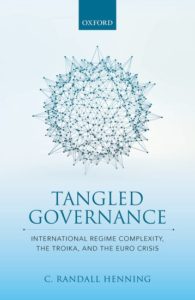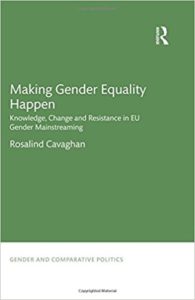

Tangled Governance: International Regime Complexity, the Troika, and the Euro Crisis
By C Randall Henning
Publisher: Oxford University Press
Recommended by Malcolm Campbell-Verduyn
At a time of on-going friction between members of the Troika – the European Commission, the European Central Bank (ECB) and the International Monetary Fund (IMF)- assessing how and why this grouping has remained at the forefront of the Euro Crisis response is more necessary than ever. In Tangled Governance C. Randall Henning reveals how the Troika itself has remained at the heart of a cohesive international regime despite significant tensions amongst its members, intense international pressures to combat the crisis and considerable failures in alleviating a continuing instability. Through detailed analysis of more than a half dozen programs undertaken since 2010 to ‘rescue’ the GIIPS (Greece, Ireland, Italy, Portugal, Spain) this book provides insightful analysis of the crucial roles played by northern European countries like Germany, as well as non-European countries- the United States in particular- in contributing to an increasingly complex set of new regional and international governance institutions.
Somalis Abroad: Clan and Everyday Life in Finland
By Stephanie R. Bjork
Publisher: University of Illinois Press
Recommended by Hélène B. Ducros
In this ethnographic work, anthropologist Stephanie Bjork delves into how the messy notion of clanship intervenes in the individual and community practices of the Somali diaspora in Finland. She shows that Somalis, although they may contest tribal narratives in public and with outsiders–and even be embarrassed by it-, use clan affiliation as a resource to construct transnational social and cultural capital through relational networks based on kinship and “clan feeling.” She further refines her analysis by providing specific situational examples of the ways in which Somali youth and women perform clan outside of Somalia, navigating an in-betweeness in a host society where Finnish values and social norms may be in tension with Somali rites, taboos, and duty to lineage. Beyond the historical and cultural particulars of the Somali global diaspora, this book provides food for thought for anyone interested in understanding migration experiences in Europe and further.
 Making Gender Equality Happen: Knowledge, Change and Resistance in EU Gender Mainstreaming
Making Gender Equality Happen: Knowledge, Change and Resistance in EU Gender Mainstreaming
By Rosalind Cavaghan
Publisher: Routledge
Recommended by Muireann O’Dwyer
The book offers a systematic and innovative approach to tackling one of the key questions of EU studies: why is there such a great variation in the adoption and implementation of gender mainstreaming? Gender mainstreaming was heralded as a transformative approach that would turn the gender equality rhetoric of the EU into practice. It was supposed to be adopted in all policy areas, at all levels of the EU. However, its actual impact has been mixed, at best. The book builds on a literature that has documented the limitations of gender mainstreaming and really unpacks the different ways that mainstreaming can be opposed or frustrated. In doing so, it points to a way forward for activists and scholars seeking to understand how change can be brought about. The book uses a particular case study of the field of research policy, but the methodology and the overall framework could potentially be applied across policy areas, and even to issues besides gender mainstreaming.





